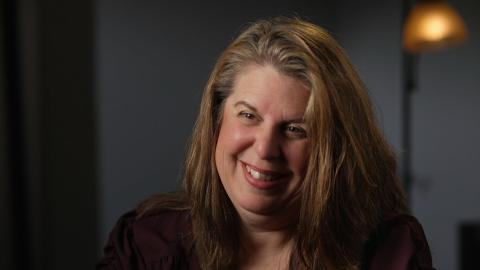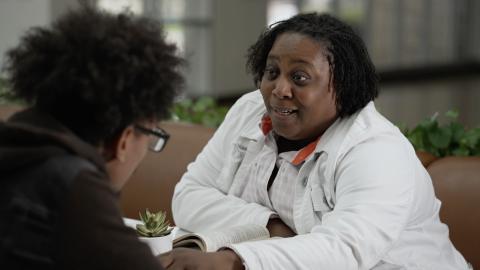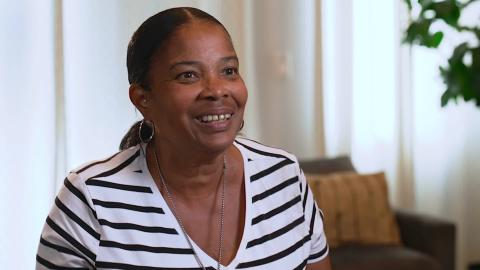Descendant of Thomas Jefferson Shares Her Roots
For Gayle Jessup White, landing the job of Public Relations and Community Engagement Officer at Thomas Jefferson’s historic home, Monticello, was more than a chance to share her passion for American history. It was the result of a lifelong search for the truth about who she was, and America’s third president.
It started when she was a young girl growing up in 1970s Washington D.C.
“At the time Jefferson was my favorite president because he'd written the Declaration, and I believed and still believe in the principles put forth in that document,” says Gayle.
She was thirteen when her sister shared a bit of family lore regarding the main author of the Declaration of Independence…they were related.
Gayle recounts, “Well I was shocked. And I went to my dad first, ‘Daddy, how could we be descended from Thomas Jefferson? This doesn’t make sense to me.’ All Daddy said to me was, ‘That's what they say.’”
For years, Gayle would dream of one day finding out if what “they said” was true.
She says, “I always felt that if I could determine my ties to Jefferson, I could find out more about my family. We are the sum total of our backgrounds of our ancestors, and I didn't know who mine were. I needed to know that to feel whole.”
In the 90s, when Gayle was out of college and building a career in journalism, she got serious about her search. But finding records of enslaved people from the 1700s wouldn’t be so easy. The biggest clues came from stories passed down through her father and his family.
“Oral history matters because for many Black people that's all we have,” Gayle explains. “They were treated as possessions. They were possessions. So you might find information about them on tax records, on wills, but you won't find them in the census record for the most part until 1870.”
As Gayle followed her own leads, DNA research confirmed the long-told rumor that Jefferson had children with an enslaved woman named Sally Hemings. She says, “For many years I assumed I was descended from Thomas Jefferson and Sally Hemings. Little pieces were coming together, but not enough for me to understand how we could have been descended. It was just enough information out there to keep me aware of the possibility.”
Gayle would spend years following clues, tracing her family tree, and scouring historical records. Then in 2010, while with her son on one of many visits to Monticello, Gayle says, “We go on the tour and the guide says, ‘Well, Sally Hemings and Thomas Jefferson had children together.’ And I raised my hand as I always did, ‘We're descended from Sally Hemings and Thomas Jefferson.’ And the guide says, ‘Well, you're dignitaries, you're family.’”
Unlike previous guides, this one took an interest in Gayle’s story, and connected her with Monticello historian, Cinder Stanton. With Cinder’s help, Gayle’s four decades of research would soon culminate: Thomas Jefferson was her 5-times great grandfather, and Sally Hemings, her 4-times great aunt.
Gayle explains, “I'm actually descended from her brother, Peter Hemings, who was a cook at Monticello.”
The kitchen where Peter worked came to be one of Gayle’s favorite rooms at Monticello. “When I'm in that space where I feel the presence of my ancestors. That's sacred ground for me,” says Gayle.
In 2014, Gayle was selected for the fellowship program at the international center for Jefferson studies. Her discoveries there opened a window into who her ancestors were: overcomers who helped build America while being oppressed by slavery.
Gayle says, “I’m proud of my relatives who were enslaved because they were up against so much. They survived. They were strong. They were tough. They were able to pass down character, dignity, strength, humanity, love, joy, pain, resilience, to their descendants. That's why I'm here, because of them. If we are going to heal as a country then we have to be honest about our complicated history, and it is very complicated and it's very painful.”
It was in 2016 that Gayle came on-staff at Monticello, educating the public about the legacy – the good and the bad – of one of America’s Founding Fathers.
She says, “I recognize Jefferson now as being a human being. He was a flawed human being who made some horrible decisions, sinful decisions. Owning people is sinful. On the other hand he gave us those soaring words that I amend to say ‘All humans are created equal’ that have served as inspiration for hundreds of years now, for people to fight for their freedom and liberty, and justice for all. So Jefferson represents the full complexity of this country and how it was founded.”
In her book, Reclamation, Gayle chronicles her journey to find her heritage, and more.
“It serves at a metaphor not just for my family,” Gayle says, “but for Black families in America to understand - and for all people to acknowledge - that our ancestors helped build this country. I found not just the history, but I found my family. And I've made those connections. And I've found my wholeness.”
A wholeness she hopes all Americans will soon share. She says, “We are one people. We have more in common than not. It’s important to look at each other and to work through those differences and see ourselves as Americans and recognize the kinship. It’s an American story.”



